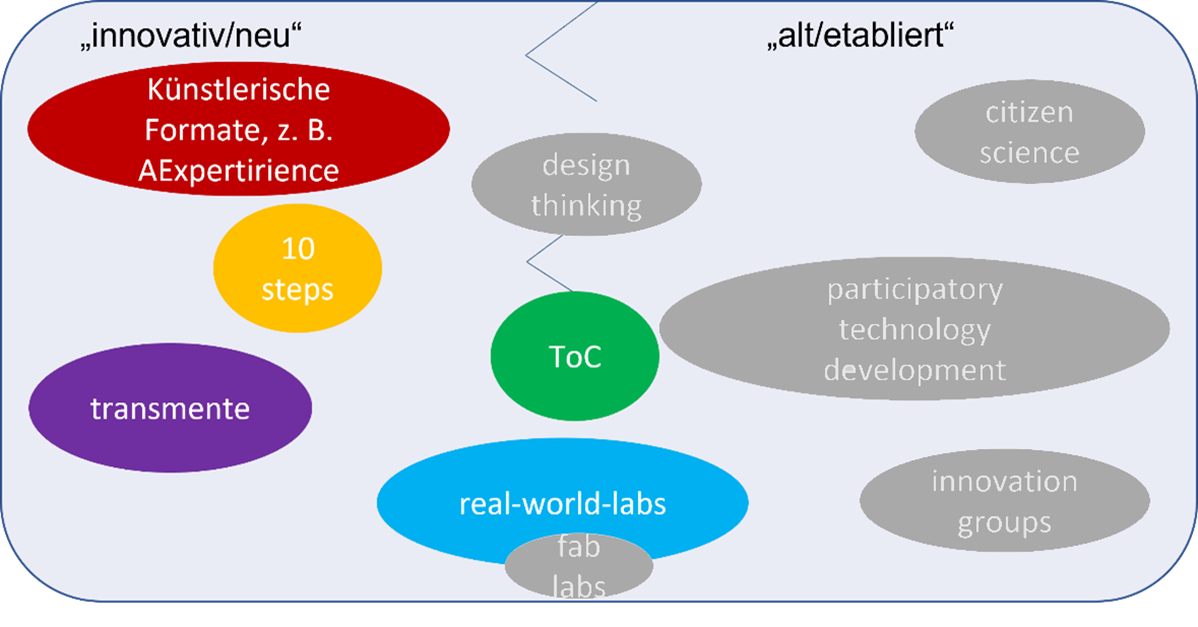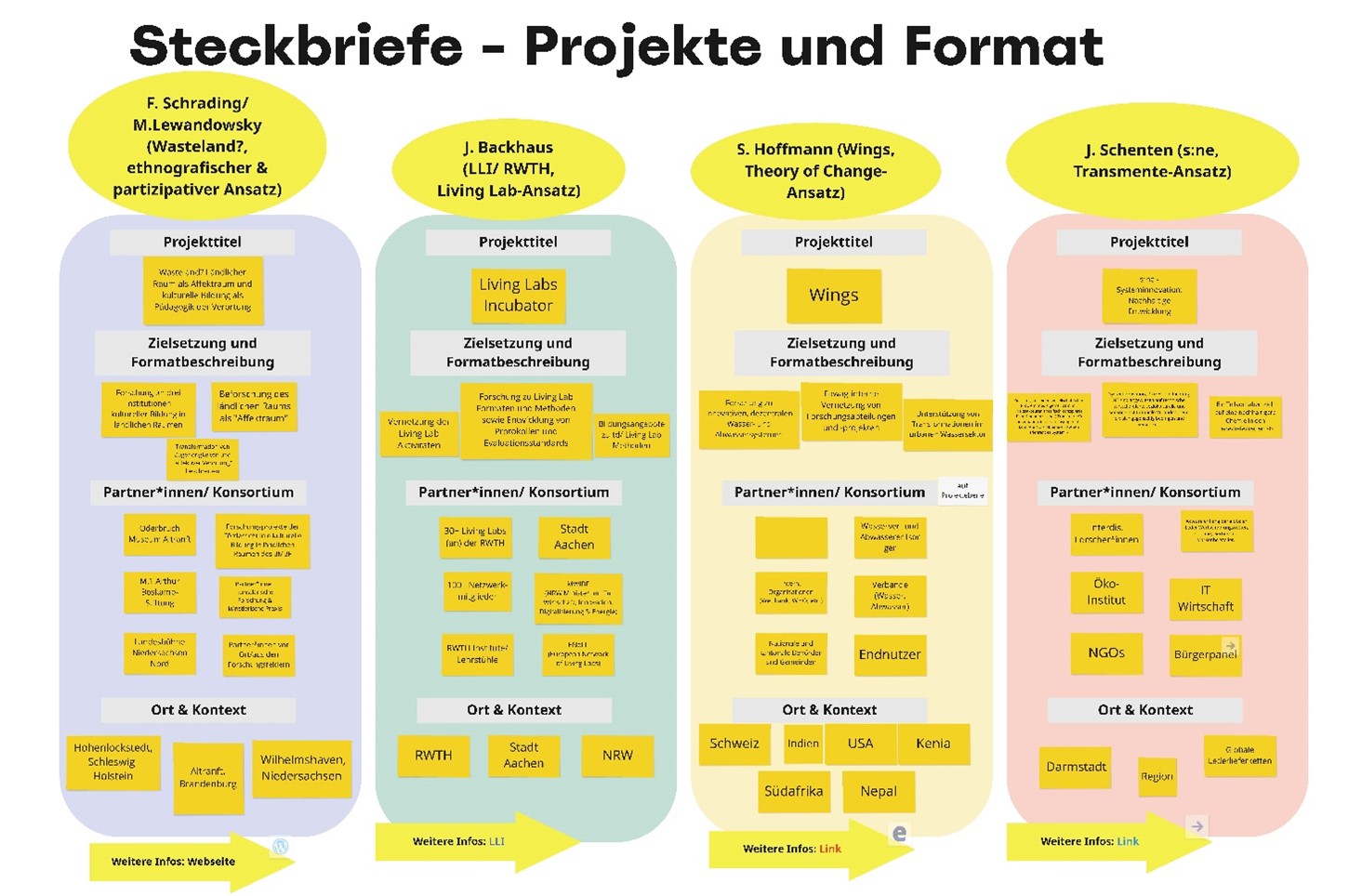On 17 March 2022, Bettina Brohmann and Melanie Mbah (both Öko-Institut e.V.) organised a digital reflection workshop on topic line 4 "New Formats" as part of the Darmstadt Days of Transformation, Workshop 4 of the tf Symposium. In a one-and-a-half-hour workshop format, the first interim results on the role and design of innovative formats of transdisciplinary research were presented and discussed with numerous participants.
The workshop took place within the frame of topic line 4 "New formats" as the first part of the reflection on results. The aim was to reflect on the first interim results of the topic line and to discuss them with experts on the basis of four guiding questions. Building on this, the results will be further developed and presented and discussed in a second reflection workshop planned for 2023. Five selected formats stand in the focus of the investigation in topic line 4. In the workshop, the spotlight was placed on the formats Transmente and living labs (as one approach of the real-world laboratory format) as well as on arts-based approaches. Julian Schenten (Darmstadt University of Applied Sciences/s:ne), Julia Backhaus (RWTH Aachen/LLT) and Fiona Schrading (Wasteland project) provided a brief impulse on each of these three formats. The Theory of Change format, prepared by Sabine Hoffmann (EAWAG/Zurich), could unfortunately not be discussed in detail due to illness, but was outlined. The Ten Steps format was not taken up in the workshop due to time and conceptual reasons.
The reflection workshop was introduced by Bettina Brohmann as main moderator. Melanie Mbah then provided a brief overview of the previous results on innovative formats. The aim of topic line 4 is to analyse under which conditions which methodological approach is suitable or which individual methodological elements are suitable in order to be able to achieve the expected quality of processes and results in an integrated way. In the workshop, first of all, the understanding of the differentiation between format and method, which underlies topic line 4, was presented: According to this, formats include at least two phases of transdisciplinary research and, ideally, the entire transdisciplinary research process. On the other hand, depending on the phase and format, different - but also related - methods from different scientific disciplines are combined, such as empirical social research and transdisciplinary research. Innovative formats are those in which practitioners are intensively involved in the research process in a collaborative way, i.e. they are more than knowledge providers or users. As such innovative formats, the following five formats are analysed in more detail in topic line 4: real world laboratories, arts-based approaches, transitions, Ten Steps and Theory of Change (see Figure 1). What all these formats have in common is that they include the three mentioned aspects of the definition of innovative formats. This means that they require intensive collaboration between researchers and practitioners, cover at least two phases of the transdisciplinary research process and combine different methods in the individual phases.
Figure 1: Selection of innovative formats for research in topic line 4

Source: Own collection, based on the research from TransImpact (see Grunwald et al. 2020) and a systematic literature review.
The dialogue forums that had been held so far (on the inclusion of practitioners; on the diversity of the real-world laboratory format and on innovative formats in general) and individual guideline-based interviews showed that the challenges in the initial phase of a transdisciplinary project are particularly large. The main question here is how, in such projects with initial strongly research-oriented questions and impulses, the practitioners can be engaged. At the same time, it became clear that the added value of joint solutions lies at very different levels and that different obstacles come into play here. Here it is important to reduce fears and obstacles regarding upcoming behavioural and institutional changes. It also became apparent that scaling and context in particular are important framework conditions for a common understanding of the problem and for achieving effects. Since transdisciplinary projects often work on a small scale at the local or regional level, the question of the impact of these "small steps" towards sustainable development and their scientific measurability arises.
As a preliminary finding, it could be stated that in all innovative formats, the iterative-reflexive and bi-/multidirectional inclusion of practice actors is central, and in this way novel results and products, such as prototypes like a "principle office for the impossible" (as an artistic intervention) or also networks and mappings are developed, which require a methodological openness and new competences of both research and practice. Flexibility is a key element of transdisciplinary research in order to enable adaptation and re-adjustment. But joint reflection and collaborative development of interventions are also central. A common understanding and the establishment of a foundation of trust between researchers and practitioners is also important as a starting point. The practice of transdisciplinary research also shows that contexts are important for combinations of methods or their adjustment, but that the focus lies on the goal and the problem.
Based on these initial findings, the previously mentioned impulses on Transmenten, arts-based approaches, living labs and Theory of Change were given (see Figure 2) and discussed on the basis of four guiding questions. The four guiding questions were:
- according to which criteria and with which actor involvement were the format and method chosen?
- what influence did goal orientation, problem impulse and actor constellation have on the choice of format or format development?
- were various methods combined and how (for what reasons, in which phase of the research process)?
- how did the motivation for the participation of different groups of actors in the co-production succeed over time?
In the discussion of the four guiding questions with the participants, it became clear that in the question of goal orientation and problem impulse in the set-up phase of a format, the focus lies initially more on the acquisition and motivation of committed actors, in order to (later) define the goals more precisely with them in an actor network beyond the problem impulse. Ethnographic approaches in particular enable a new understanding of the context and the competences of the actors (socially relevant stakeholders) by including the significance of the (regional) space. Artistically and culturally connecting approaches seem to trigger an identity-creating impulse - especially for locally/regionally located projects - which can lead to a higher self-efficacy and motivation of groups of actors. Even if arts-based approaches do not initially seem to pursue a concrete goal with their interventions, but rather aim to cause irritation, changes in behaviour are set in motion here. In connection with arts-based approaches, it is important that, as far as possible, no presumptions are made. It became clear that there is still a great challenge in integrating science-remote or education-remote population groups into transformative projects and transdisciplinary research. Here, too, arts-based approaches can help.
In social-ecological format contexts, such as the locally or regionally based real-world laboratories, there is often a (strong) orientation towards social sustainability and network building at the local level. This orientation is associated with various consequences for the methodological structure and process of the formats (e.g. strongly participatory methods in real-world laboratories and living labs), but also with its possible effects on the other dimensions of sustainability.
In summary, artistic formats and intensive collaboration can be helpful in the first phase of the transdisciplinary research process, especially for the creation of identity and the associated motivation of the actors involved. It should be noted here that the formats in focus here have so far been used more at the local and regional level, especially because the spatial proximity of the actors and face-to-face meetings are of great importance for identification with the project and for building trust. At the same time, flexibility and openness are central prerequisites for cooperation with practitioners. With regard to the selection and combination of methods, it should be noted that these are often situational and context-related, especially in real-world laboratories. For the selection and adaptation of formats and methods, further concretisation of the selected formats is required.
Figure 2: Impulses for different innovative formats

Source: Illustration from the workshop.
